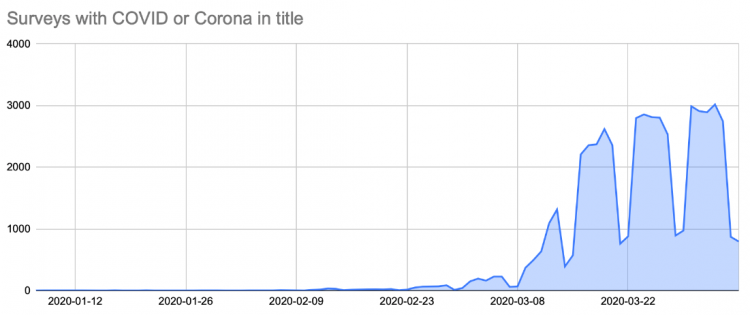Even if you forget the new protective government mandates that have been put in place to combat the coronavirus crisis, it seems many of the rules for etiquette and courtesy have changed overnight.
As we all get used to a new way of working (and living), it’s worthwhile to reassess what’s OK and what’s not in the time of social distancing, working from home, and a generally heightened anxiety about the state of the world.
In this spirit, several SurveyMonkey customers have contacted our support team with a few simple, but difficult, questions: Is it OK to send people surveys during a time when they’ve got so much on their minds? Is it OK to ask people about how coronavirus is affecting their lives?
The short answer to both questions is “yes,” but read on to understand why.
Is it OK to send surveys during the coronavirus crisis? We asked!
In case you were wondering, the daily number of people responding to surveys on SurveyMonkey’s platform hasn’t changed significantly one way or another since the start of the crisis. People are still answering questions about their jobs, their products and services, their classes—with maybe a few extra virtual happy hour scheduling surveys than usual.
Just to be sure, we asked 546 panelists on SurveyMonkey Audience, our global consumer panel, whether they mind taking surveys during the coronavirus crisis. Here’s what they said:
- 95% said they are the same or more likely to take surveys now than they were 3 weeks ago. 85% said they are answering the same amount or more surveys than they were. So there is potentially a gap between survey volume and willingness to respond.
- 95% of respondents said it was appropriate for companies they work with (as a customer) to be sending surveys in the current environment.
- On the employee side, 86% of respondents said it was appropriate or completely appropriate for their employer to be sending them surveys in the current environment. 27% actually thought they should be getting more surveys from employers, and only 6% thought there were too many.
During a time when it’s challenging to meet face-to-face with the people you want to hear from, it’s OK to overcommunicate a bit using the tools you have available.
Visit our coronavirus resource page
Get data from our pollsters about public sentiment of the coronavirus crisis, survey templates designed to help ask about coronavirus, and even discounts for students, educators, and nonprofits during this trying time.
Is it OK to send surveys about coronavirus? The data says yes.
If you’re curious how other people are coping in these uncertain times, you are not alone. The graph below shows the number of surveys people have sent that contain the words “COVID” or “corona” in their titles during the past 90 days (in a view that was anonymized and aggregated for user privacy).

As you can see, SurveyMonkey users went from sending close to zero surveys about coronavirus to sending around 3,000 surveys a day that contained “corona” or “COVID” in their survey titles by March 22nd. The dips after the first spike you see represent weekend survey sends, and are consistent with the normal patterns we observe on our platform.
The sheer volume of the increase in interest about the topic is remarkable, and maybe even a little scary. Are people really that nervous—or even obsessed—with this crisis?
We prefer to look at it from a different lens: Our customers really want to know how everyone is doing in this trying time.
The physical distance we’re required to keep these days makes it more challenging than ever to check in with the people we care about—our friends, students, colleagues, employees, and customers. Our customers are using surveys to see how people are feeling, make sure they’re supported, and understand what they’re going through.
So if you’re wondering whether you should be using surveys to ask the people who matter to you how they’re doing during this crisis, we think the answer is a resounding yes.



